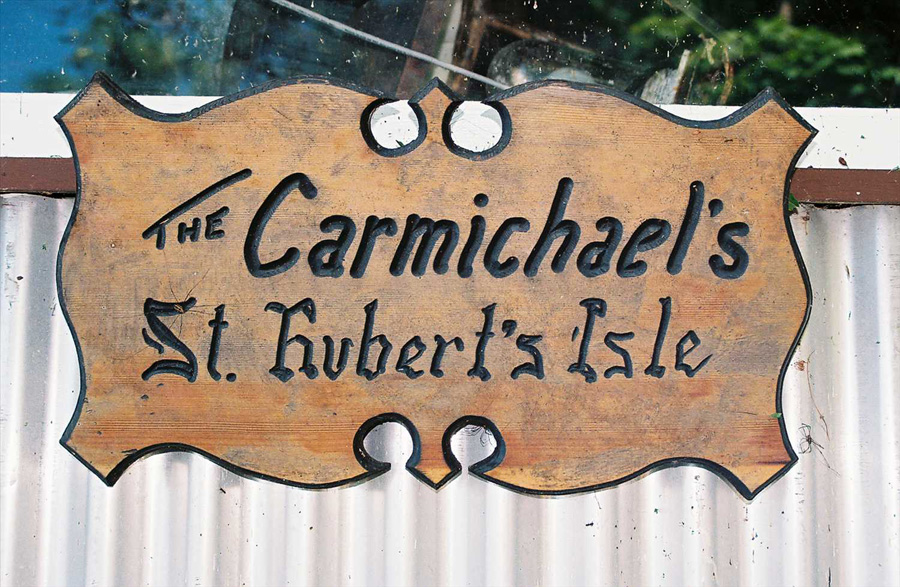Understandings (page 3)
by Ralph Miller Carmichael
Advent 1992
The Church’s ID
One might call it a tragic necessity that a religion must organize. But there is no possibility that any religion may live, without organization. Inevitably it has something to say as to its identity and its tenets. It needs to know who are its adherents, and who are not. Whoever says he does not believe in organized religion probably has many justified criticisms of the ones he knows; but he will not likely find one that is not organized.
The Episcopal Church believes a Church is fully catholic if it has the Bible, Creeds, Sacraments, and the Apostolic Ministry of bishops, priests, and deacons. But the Episcopal Church is also protestant, in that it recognizes virtually all other Christian bodies, and welcomes all baptized Christians to its celebrations of the Holy Eucharist. E.g., I would never want to give up any of the four features mentioned above, and known as the Lambeth Quadrilateral. But I see them not as absolutes that exclude from fellowship with God anyone who does not accept them; but rather as guidelines of indispensable value, which the whole Church needs in all its branches.
Neither the Anglican Communion nor the Eastern Orthodox Churches believe the Roman Papacy was a part of the original Catholicism of the Church. The Episcopal Church in the USA further sees, as the rest of its self-definition, that, while it is self-governing, it is vital to remain in full communion with the See of Canterbury in England. I think probably all the Churches of the Anglican Communion are founding members of the World Council of Churches. The Archbishop of Canterbury was the presiding officer when the WCC was founded in 1948. When the present Archbishop of Canterbury visited the WCC headquarters at Geneva in late 1992, he said he felt he had just come home.
From the beginning, the Church had Apostolic leadership; and celebrated the Last Supper, the Eucharist. The Apostles’ Creed took form a couple of centuries later. Out of a plethora of gospels, letters, and apocalypses (literature about the end of the world), the final selection of New Testament literature was settled just before 400 AD. Likewise the Nicene Creed was formulated in the 4th century. These decisions were forced upon the Church by challenges from within and without.
So the full Catholic substance (Bible, creeds, sacraments, ministry) belongs in the Church; and we believe the Book of Common Prayer expresses them faithfully. And also the Protestant spirit belongs in the Church, ever bringing its criticism upon absolute claims, exclusive teachings, narrow doctrines, rigid, moralistic judgments, and complacency, all of which produce the hypocrisies that Jesus denounced.
Eschatology
This 5-cylinder word comes from a Greek word, eschaton, which means the END. Not the sense of the final finish; but in the sense of the completion, the final fulfillment. The Christian Faith does not believe that history will ever reach perfection. We do not see the culmination-of-it-all occurring within time and space. As long as human life on this planet continues, there will be problems. The “In Spite Of section indicates that every effort to make life better for somebody else is well worth the trying, whether it succeeds or fails. This is a word of comfort to every parent and counselor, to every president, general, CEO, and demonstrator.
What about the end result? The Christian Faith declares that God has given us a glimpse:
It Is Great, Beyond All Imagining!!!
This is not a promise for selfish persons. The Christian Universalists believe that—in the last analysis—God overcomes everybody’s shortcomings, and brings absolutely everybody into His Heaven. Most of us do not see how this can be, without emptying the seriousness out of Jesus’ teachings and out of ethical responsibility in general. Is the meaning of Judgment finally dissolved? Tillich suggests the fate of those who persist in resisting God (resisting Church membership may not mean resisting God) is nonbeing. Hell means to be out of the picture when all is said and done. I find this acceptable, though difficult. Could we really say, “Nothing matters”? My own feeling about the Last Judgment parable (Matthew 25 at the end) is not that if you ever once failed to offer food for the hungry, you are damned; but that if ever the worst of persons did some sort of caring act oven once, maybe that is remembered in heaven, and makes all the difference.
We had better leave that to God! Our assurance is that every one of us is important to God. (Remember now what was said above regarding symbolic language.) He calls us each by name, and He is not about to let us go. Everything that is meaningful to us in life is secure. It is not going to be lost. It will rather be fulfilled. In the hands of this God Who is really God, we cannot lose. We can’t imagine what it means, but it remains true that “eye has not seen, ear has not heard, neither has it entered into the human heart what God has in store for those who love Him”.
We should note that, at the end of his famous chapter (1 Corinthians 15) on the meaning of the Resurrection of Jesus Christ, Paul winds up with the exclamation that THEREFORE, we can carry on with our lives and our work, in the victorious confidence that “our work is not in vain”. Now that is something! We are saved from the dreaded agony of despair. Indeed, says Paul, “we are more than conquerors!” (See the closing verses of Romans 8 for the finest expression of the Christian message.)
Our God is such a wonderful, wonderful God! He loves you, with everlasting love. He calls you by name. He will never abandon you. You and I are His prodigal children. But He is Our Father, longing, waiting for us, rejoicing when we first come into sight, on our way Home.
Epilogue
How do writers of books finally stop and say, “That’s it”?
The Virgin Mary holds a prominent, sometimes predominant place in popular piety. Maybe I have missed something. Mary was doubtless a good and pious Jew. No doubt (in my mind) she was impregnated by her husband, Joseph, after their marriage, giving birth to Jesus, the first of at least seven children. His brief career was obviously puzzling to her, probably frightening. He said his true followers were his real family, not his blood relations. He denied that Mary was blessed just because she was his mother. I want to believe that she did find salvation through him, and became a member of the Church. A younger brother, James, did, becoming the bishop of Jerusalem – and yet James never quite “got it.”
The whole Bible shows us that persons whom the world, and/or they themselves, consider to be important are usually a disappointment to God; and that the ultimate objectives of the Kingdom of God in history are best served by men and women who in their obscurity grow wheat, study birds, teach kids, advance technology, entertain, buy and sell, write letters, fly planes, police cities… with gratitude to God and respect for people.
The most dangerous people in the world, the kind who wanted Jesus dead, are those good people who are so fanatically committed to what is true and right (as they see it) that they regard themselves as the defenders of all that is holy. They are quick to call any agent of change, like Jesus or those in any age who think following him means calling for change, an agent of Satan. They soon take action, and craftily carry the crowds. They are called right-wing and conservative, though they commonly despise conservationists. Church members of this leaning make idols of Prayer Books and moral laws and traditions. But Jesus and the prophets represent the cutting edge of change. How can a genuine Christian give unqualified support to any status quo, as, though this were already the Kingdom? How can a genuine Christian avoid such concerns as the present world dubs “left-wing” or “liberal”?
Everybody makes value-judgments. Kindness is right; cruelty is wrong. But why so? What about Islam’s practice of cutting off a thief’s hand? Every value-judgment implies a presupposition, a norm which is assumed to be beyond question. If B is better than C, presumably that is because it is closer to A. Then what is A? ‘A person should know, when pressed, someone may reply, “Well, that’s what I think.” This is a weak and untenable position. It also, I believe, is the weakness of the Unitarian position (I admire their values, but by what criterion do they recognize truth?). For adherents of any religion, the ethical criterion is given in the revelatory event. We deplore racial slurs, harassment, and prejudice because this violates the Spirit of Jesus as the Christ. That Spirit is the Spirit that is Holy, so we believe. As Christians, we know where we stand is to our ultimate criterion: Jesus the Christ.
Living amongst the ambiguities of history, we should be clearly conscious of this criterion; and we should guard against the idolatrous temptation of identifying our favored position on issues (like birth control, pacifism, homosexuality) as inherent within the criterion itself, and hence absolute and decisive. Unless we are pretentious, we must acknowledge a certain embarrassment in deciding. Maybe there are no “Christian” positions that are absolute for all times and circumstances. My Church held one on divorce; and had to abandon it. So it is becoming to us to assert our positions as to what is right with just a touch of tentativeness, at least before God. But then we must dare to act, bearing the responsibility and the risk.
I entered seminary believing, like many green converts, that I knew Jesus better than the “organized Church” did. My second conversion (completing the distorted first one) left me far humbler, my perfectionism gone, and wishing to belong to a Church that knew it knew Jesus better than I did, though that meant it also had to be open for new truth.
I have been very grateful for the Episcopal Church, with its rich, almost unique, melding of the catholic and Protestant traditions, its deep sense of history, its music, and its ecumenical outreach. Its fellowship embraces a vast variety of viewpoints. Its tradition is so rich, probably no one person and no one parish ever experiences or expresses the fullness of it. It is only fitting and tolerable that our structure gives voice and power to all geographical parts of the Church, and to the laity, to the parish priests and to the bishops.
Of course, nothing is perfect this side of Heaven.




















